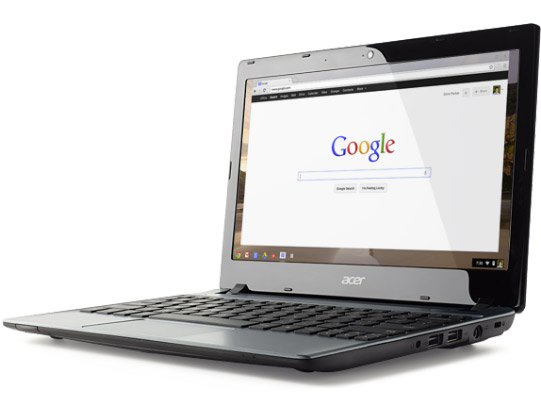The future is Chrome
March 2013
If I had any shares in any computer manufacturing companies, I would sell them; the whole industry is very unstable. This is good news for those of us who just want to use the wretched things, but it is bad news for the manufacturers. It is forcing them, at last, to design machines that are much easier to use, but most simply won’t manage it.
I’ve been saying for ages that the computers we’ve been buying at huge expense for the last twenty years are not much more than expensive prototypes, and when the industry and the market matures, they’ll be thrown in the skip and we’ll all be regretting the sums wasted on them. Prices are already falling fast, but I have the strong impression that our patience is running thin at a faster rate and I think that we have reached something of a tipping point.
It’s all partly because normal people are fed up with paying through the nose for temperamental, over complex and unreliable bits of kit, but mainly because they have begun to realise that they no longer have to. The truth is that very few of us need anything but a really basic model, and most of us don’t need that much; surprising numbers of people are even finding that they can achieve all they really want to do on a smartphone that costs under £100.
Consequently, when we do buy a new one, we tend to buy a cheaper one; on top of this, even though they are still pretty unreliable, computers are more dependable than they were, and so we keep them for longer. So there are now more sellers than buyers, and we are spending less; one analyst I read is even predicting that sales could drop by a third, which in what is supposed to be a growing industry is bad news. Whenever that happens we buyers have the whip hand and the people who make things that actually work will win our custom.
All this is forcing the manufacturers to raise their game. To get us interested again they have to give up increasing the raw power of the machines (we don’t need that) and focus on what is known as the UI. Many readers of the Oldie might assume that “UI” is something to do with infection below the belt, but in computer-speak it means User Interface.
That, of course, like most jargon, is also impenetrable. Jargon is fine between consenting adults but no use to the rest of us. User Interface means “what you can see and use to control it”. If your computer were a car, the UI would be the steering wheel, handbrake, pedals and the rest. That’s how you control the machine but you don’t really care how it works.
So it is with your computer. What actually matters is what it can do and how you control it, not how it works, and some great strides are being taken in making them easier to use, or at least, less difficult.
For example, I recently helped someone in his 90s get to grips with his new Chromebook, from Google. Whilst it currently has some limitations, I think it’s the future.
 ChromebookIt looks and operates like a small laptop, and costs less than £200, but it’s biggest selling point is that as it is mainly a conduit to online services, Google are doing all the hard work; forget software updates, forget antivirus software, forget backing up - Google do all that for nothing. Crucially (and this is the big commercial issue) also forget Microsoft or Apple.
ChromebookIt looks and operates like a small laptop, and costs less than £200, but it’s biggest selling point is that as it is mainly a conduit to online services, Google are doing all the hard work; forget software updates, forget antivirus software, forget backing up - Google do all that for nothing. Crucially (and this is the big commercial issue) also forget Microsoft or Apple.
So you can see why I think it’s all changing, and from our point of view, changing for the better. But which companies will survive the mêlée? I haven’t a clue, and nor has anyone else. That’s why I’d sell my shares, if I had any, and think about buying a Chromebook.
____________________________________________________
Links:
The Official Chromebook site: Click here

